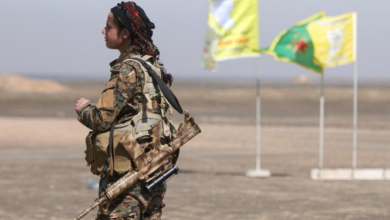
So far, Trump has refused to fall into the traps laid out by Iran
Raghida Dergham
Donald Trump has refused to be ambushed by Iran into a military confrontation for many fundamental reasons, including a keenness to retain control of the timing of how international issues are managed.
This is more important to him than provocations by the Iranian Revolutionary Guard Corps. June 28, for example, is a crucial date for the US and Iran, albeit for different reasons. Tehran wants to lure the US into a limited military response against its provocations, prior to the G20 summit in Osaka. It wants developments in the Gulf to dominate the agenda of the meeting, including by forcing Mr Trump to miss it.
Mr Trump has strongly resisted the Iranian trap. The meeting with Chinese President Xi Jinping in Osaka to discuss the future of the two powers’ relationship far exceeds that of the Islamic Republic, yet the summit will be useful for the president to mobilise political support for potential military action and additional measures against Iran.
According to informed sources, the US response to Iran’s downing of an American drone over the Gulf – the first direct Iranian attack on a US asset – will include a “military component”. The likely scenario for retaliation will include ramping up sanctions on Iran in parallel with limited “preventive” military steps targeting IRGC bases, and perhaps a nuclear site such as the one in Isfahan.
Meanwhile, if Tehran decides, in a meeting scheduled for June 25 to 26, to withdraw from the nuclear non-proliferation treaty (NPT), the US could step up its strategy of isolation, with the possibility of a naval blockade, freezing the assets of all those who deal with Iran, or even military action.
If Iran refrains from further escalation, the window of opportunity for a deal will be open, but not the kind that Iran wants. Tehran’s tactic so far has been to provoke Washington to the point that it reaches a “red zone” and is willing to cut a bilateral deal. This requires vigilance on the part of Arab Gulf countries of what is being prepared in other world capitals in terms of facilitating US-Iranian accords, and co-ordination to foil any attempts to sideline them from the conversation.
Part of the military escalation tactic pursued by Iran has succeeded. The Iranian game is to rally European and Russian pressure on the US, in parallel with military escalation against primary and secondary US interests, in order to force Mr Trump to back down from his strategy of strangling Iran economically and into pursuing a military option.
The EU capitals have fallen into the Iranian trap, as shown by their reactions to the drone incident, questioning the US narrative and calling for an investigation into whether the drone was in Iranian or international airspace as claimed by Tehran and Washington, respectively.
Russia’s President Vladimir Putin is aware that he has some avenues open to him, but that he will not be able to put real pressure on Washington. Washington wants Mr Putin to take action against the IRGC presence in Syria, while he seeks serious talks with Mr Trump in Osaka regarding various issues. Mr Putin has welcomed the idea of phone negotiations with President Hassan Rouhani, and is facilitating de-escalation efforts, but he will not pursue a full strategic alliance with Iran in this crisis.
A source said that the Russian president sees the Osaka summit as an opportunity to hold serious negotiations with Mr Trump. The American side’s hesitation to set an agenda for the talks may change now, in light of the dramatic events in the Gulf and the Strait of Hormuz. Mr Putin, like Mr Trump, does not want the US president to miss the summit in the event of conflict, or for the crisis to dominate the summit’s agenda.
According to sources, Mr Trump wants to postpone his response to Iran until after the summit, where he intends to first rally support for his upcoming moves. Iran will only be able to hijack the G20 meet if it undertakes major escalatory actions, which would almost certainly force Mr Trump to skip the G20 meet.
Sources in contact with Tehran have confirmed that the IRGC is considering launching two more attacks on oil tankers in the coming weeks. However, the major event next week will be related to Tehran’s decision on whether or not to remain in the NPT.
In a series of tweets on Friday morning, Mr Trump confirmed his decision to call off air strikes on Iran. He is also carefully considering his military options with the Pentagon favouring limited and targeted operations, in addition to further sanctions.
He is convinced of the effectiveness of his strategy, believing that it will force Iran’s leaders to accept a new nuclear deal that addresses the flaws in the original agreement, sets limits on the development of ballistic missiles and puts the brakes on Iran’s regional expansionism. From the start, the military option was not on the table except in the context of pre-emptive and preventive action.
Iran’s leadership sees Mr Trump’s current strategy as a mortal threat to the regime, domestically and regionally. For this reason, it has resolved to invite a US military response in the hope that Mr Trump will back off under domestic and international pressure. Second, Iran wants to push Mr Trump into a bilateral deal that will put an end to the sanctions that have crippled the regime.
On the other hand, Iran’s leaders have categorically rejected any call to reform the regime or curtail its regional projects. Tehran is also betting on convincing the Trump administration to cut a deal in return for secret concessions on its nuclear and missile programmes, while maintaining Iran’s regional influence.
In this context, Arab Gulf countries must be vigilant of a possible US U-turn. Mr Trump is a president who wants to stay in power, and wars do not usually help re-election. Iran is betting on this, but that strategy could backfire, if it goes too far in provoking US patriotic sentiment.
For the time being, Mr Trump is patient. He has offered concessions and avoided military responses, and has called on Iran to negotiate without conditions. Meanwhile, the Iranian leadership is doing the opposite, strategically and tactically.
So, who will blink first, and who will lose if war erupts? The US has the ability to outlast Iran, because, in contrast to Iran, it is not in economic freefall.
Iran’s leaders have an option other than strategic recklessness. Reforming and changing the behaviour of the regime is in the interest of the Iranian people, and in the interest of peaceful coexistence with its neighbours, as a major regional power that stays within its borders. Expanding into the Arab world to impose its revolutionary model and IRGC control is not in Iran’s best long-term interests.



